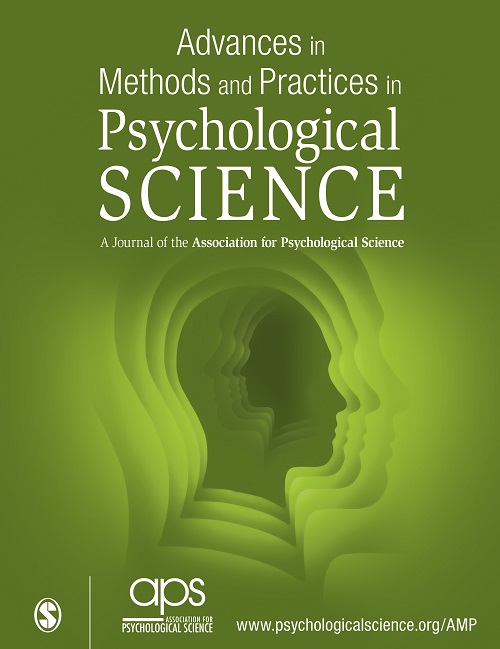Keeping Meta-Analyses Alive and Well: A Tutorial on Implementing and Using Community-Augmented Meta-Analyses in PsychOpen CAMA
IF 13.4
1区 心理学
Q1 PSYCHOLOGY
Advances in Methods and Practices in Psychological Science
Pub Date : 2023-10-01
DOI:10.1177/25152459231197611
引用次数: 0
Abstract
Newly developed, web-based, open-repository concepts, such as community-augmented meta-analysis (CAMA), provide open access to fulfill the needs for transparency and timeliness of synthesized evidence. The main idea of CAMA is to keep meta-analyses up-to-date by allowing the research community to include new evidence continuously. In 2021, the Leibniz Institute for Psychology released a platform, PsychOpen CAMA, which serves as a publication format for CAMAs in all fields of psychology. The present work serves as a tutorial on implementing and using a CAMA in PsychOpen CAMA from a data-provider perspective, using six large-scale meta-analytic data sets on the dark triad of personality as a working example. First, the processes of data contribution and implementation of either new or updated existing data sets are summarized. Furthermore, a step-by-step tutorial on using and interpreting CAMAs guides the reader through the web application. Finally, the tutorial outlines the major benefits and the remaining challenges of CAMAs in PsychOpen CAMA.保持元分析的活力和良好:在PsychOpen CAMA中实施和使用社区增强元分析的教程
新开发的基于网络的开放存储库概念,如社区增强元分析(CAMA),提供了开放获取,以满足对合成证据的透明度和及时性的需求。CAMA的主要思想是通过允许研究界不断纳入新的证据来保持元分析的最新状态。2021年,莱布尼茨心理学研究所(Leibniz Institute for Psychology)发布了一个名为PsychOpen CAMA的平台,作为心理学所有领域的CAMA的出版格式。本研究从数据提供者的角度,以人格黑暗三联征的六个大规模元分析数据集为例,作为在PsychOpen CAMA中实施和使用CAMA的教程。首先,总结了新数据集或更新现有数据集的数据贡献和实现过程。此外,关于使用和解释cama的逐步教程指导读者通过web应用程序。最后,本教程概述了在PsychOpen CAMA中CAMA的主要优点和剩余的挑战。
本文章由计算机程序翻译,如有差异,请以英文原文为准。
求助全文
约1分钟内获得全文
求助全文
来源期刊
CiteScore
21.20
自引率
0.70%
发文量
16
期刊介绍:
In 2021, Advances in Methods and Practices in Psychological Science will undergo a transition to become an open access journal. This journal focuses on publishing innovative developments in research methods, practices, and conduct within the field of psychological science. It embraces a wide range of areas and topics and encourages the integration of methodological and analytical questions.
The aim of AMPPS is to bring the latest methodological advances to researchers from various disciplines, even those who are not methodological experts. Therefore, the journal seeks submissions that are accessible to readers with different research interests and that represent the diverse research trends within the field of psychological science.
The types of content that AMPPS welcomes include articles that communicate advancements in methods, practices, and metascience, as well as empirical scientific best practices. Additionally, tutorials, commentaries, and simulation studies on new techniques and research tools are encouraged. The journal also aims to publish papers that bring advances from specialized subfields to a broader audience. Lastly, AMPPS accepts Registered Replication Reports, which focus on replicating important findings from previously published studies.
Overall, the transition of Advances in Methods and Practices in Psychological Science to an open access journal aims to increase accessibility and promote the dissemination of new developments in research methods and practices within the field of psychological science.

 求助内容:
求助内容: 应助结果提醒方式:
应助结果提醒方式:


